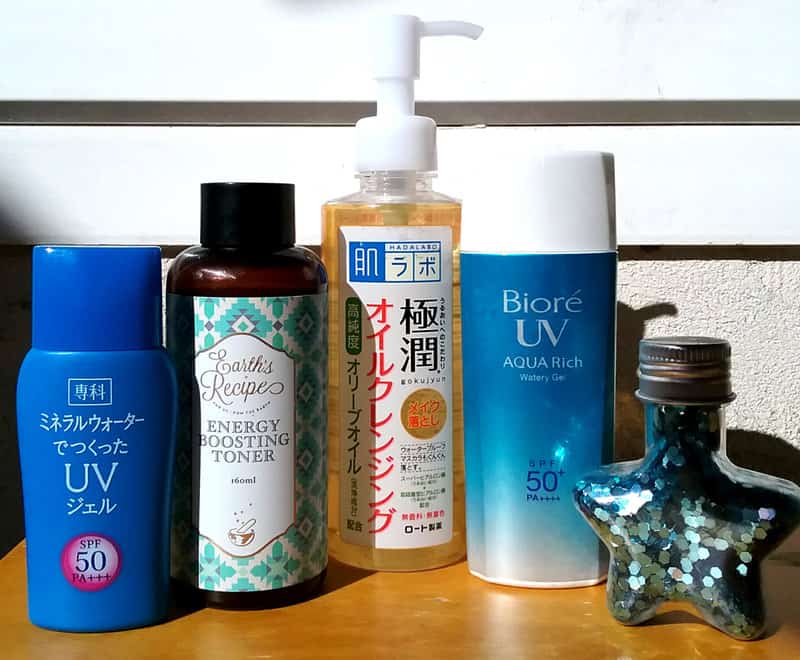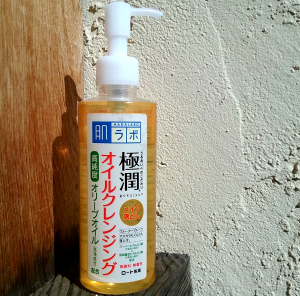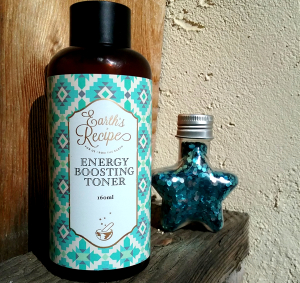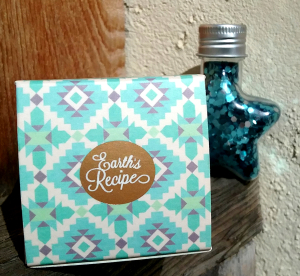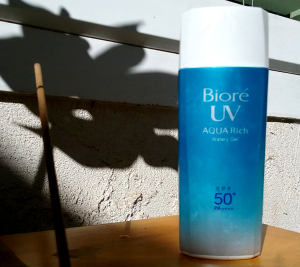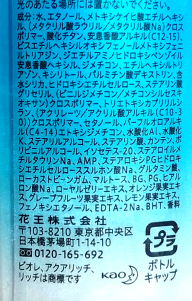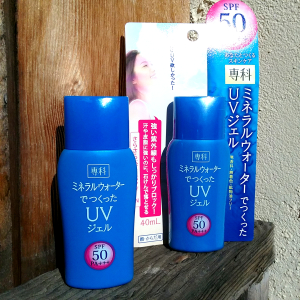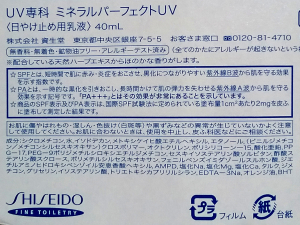Product testing is a crapshoot no matter how long you’ve been doing it. Some products you’ll like, but not so much that you want to commit. Some you’ll love and never want to let go. Some are no good. And some will make you want to claw your face off after just a little exposure, if they haven’t already clawed your face off for you. My adventures in Amazon skincare shopping over the past few months have landed me one product for each of these categories. Yay?
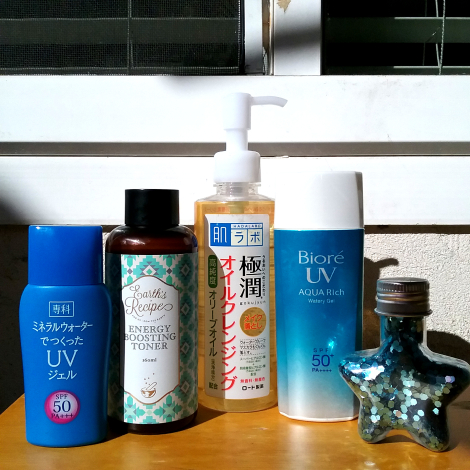
In this post: Reviews of Hada Labo Gokujyun cleansing oil, Earth’s Recipe Energy Boosting Toner, Biore UV Aqua Rich Watery Gel (2017 version), and Shiseido Senka Mineral Water UV Gel.
This post contains affiliate links, which enable me to receive a small commission on purchases made using those links. Affiliate links are marked with an asterisk(*). Products mentioned that were provided to me as press samples or by my day job are marked with double asterisks(**).
The Good: Hada Labo Gokujyun Cleansing Oil
Smear oil all over your face and rub it in to get your skin clean. Makes total sense, right?
As nonsensical as it might seem to the uninitiated, cleansing oil is a key step in the AB skincare routine. Used as the first cleanser in double cleansing, cleansing oils are supposed to break up and lift off stubborn makeup and sunscreen, then emulsify upon contact with water, allowing all the gunk to rinse easily away. “Supposed to” being the key phrase in that sentence.
In reality, there are plenty of sucky cleansing oils, like the Klairs Gentle Black Deep Cleansing Oil I reviewed earlier this year, and plenty of crap cleansing balms too, like Heimish All Clean Balm, whose continued existence in the market baffles me. Do you guys not smell what I smell when I use that stuff? Doesn’t the chunky texture bother you?
Meanwhile, my two favorites, Sulwhasoo Gentle Cleansing Oil EX*** and Amorepacific Treatment Cleansing Oil***, are on the pricey side for staple cleansing products.
I bought a bottle of Hada Labo Gokujyun Cleansing Oil because it’s cheap, and procrastination had left me in dire need of a replacement for my last oil cleanser. I’ve had generally good experiences with Hada Labo, a Japanese drugstore brand that specializes in inexpensive skincare basics.
Here’s what I look for in cleansing oils:
- Thick consistency. I dislike thin, runny cleansing oils that drip everywhere and don’t properly coat my face. Thicker oils are also better for my pore-shrinking routine.
- Slippy texture. I don’t like to feel my skin pulling and dragging when I massage the cleansing oil around. I can drag myself just fine without external help.
- Pleasant or at least inoffensive scent
- Effective makeup and sunscreen removal
- Easy emulsification and a clean rinse. While second cleansers should theoretically remove any cleansing oil residue left behind, I’d rather not give the gentle, neutral-to-low-pH cleansers I prefer too much of a challenge.
Hada Labo Gokujyun Cleansing Oil meets almost all of my requirements. With olive and jojoba oils in a synthetic ester base, this is a substantial-feeling, satisfyingly slippy cleansing oil that stays put if I leave it on for a few minutes and massages in comfortably. I can’t quite put my finger on the smell, which is light and vaguely spicy. It’s not a beautiful scent, but it isn’t strong and doesn’t linger, so that’s fine.
This cleansing oil takes off my makeup and sunscreen with no issues. I generally don’t use particularly heavy or long-wearing makeup, so I can’t speak confidently to its performance with extra hardy products, but the Hada Labo Gokujyun Cleansing Oil easily vanquishes my daily use cosmetics, including my waterproof Shiseido mascara**. As a bonus, this cleansing oil doesn’t irritate my eyes. It does make my vision a little blurry, but nearly any oil will do that. I’ve only hurt myself stumbling to the shower with this in my eyes once, and that was totally my fault, not the product’s.
Finally, the Hada Labo Gokujyun Cleansing Oil emulsifies quickly and rinses off okay. It leaves more residue behind than the Sulwhasoo or Amorepacific cleansing oils I mentioned, but not so much to cause problems for my second cleanser.
Did I mention it’s cheap? Hada Labo also sells refill bags, making it a more eco-friendly option than most other cleansing oils. I’ve refilled my bottle once already. The bag design makes the process easy and mess-free.
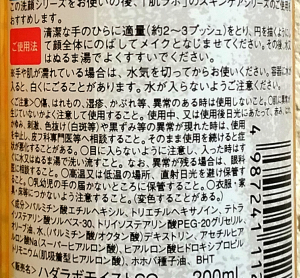
I used some of this cleansing oil to remove the Amazon label from the bottle to take this picture. Multipurpose!
One major downside of Hada Labo products is that an official English translation of the ingredients list doesn’t seem to exist online. Luckily for us, awesome AB bloggers do. My friend Nourish the Skin provides an ingredients list on her review of this product. The ingredients listed match up with those on CosDNA, and the ingredients on the label that contain elements I can read (numbers–can’t render “Sorbeth-30 Tetraisostearate” without a “30”; the kanji/Chinese character for “water”; and “Na” for “sodium”) match in position with Nourish the Skin’s list.
Final verdict? It’s good! I give it a 4/5 and, as mentioned, have already repurchased once.
Buy it:
The Great: Earth’s Recipe Energy Boosting Toner
If you’ve listened to the Snailcast or read the blogs of pretty much any of us in the snail squad, you may have noticed that while we don’t agree on everything, we do agree on one thing: the “splash mask” concept is silly. A splash-on, rinse-off mask that supposedly provides effects comparable to a sheet mask? HA.
A sheet mask’s effects depend primarily on skin being in extended contact with lots of humectants in lots of water. The occlusion a mask sheet provides greatly enhances the process. A splash-on-splash-off “mask” isn’t going to compare to a good long soak in humectant-packed essence.
I have found a couple of toners that achieve almost sheet mask-like effects, though. There’s the mega-plumping Hada Labo Gokujyun Premium Lotion I reviewed some time ago. The combination of the Green Tea Serum Toner** and Green Tea Moisturizer** in the Whamisa by Glow Recipe collab line provides impressively bouncy skin. And then there’s Earth’s Recipe Energy Boosting Toner, which came recommended to me by Tracy from Fanserviced-B. Tracy recently reviewed it too, and as usual, Tracy is not wrong.
As thick as a serum but in a much more generous bottle size, Earth’s Recipe Energy Boosting Toner spreads easily and sinks in quickly on my normal-to-sometimes-dry skin, leaving my face softer, smoother, and so engorged with hydration that it gains the dewy brightness typically associated with a good sheet mask session. The brightening effect of this toner isn’t a pigmentation-fading brightness, but rather the brightness that comes from lots of water in the skin, combined with the toner’s mild redness reduction capabilities.
The effects get even better when I layer multiple applications of the product on my face, which I’ve been doing nightly ever since I realized I could. I don’t do the full, Honey Lee-originated 7 Skin Method, with the alternating cotton pads and palm patting, but I do apply 3-4 separate layers of the Earth’s Recipe toner whenever I have time for it in my skincare routine. Unlike many hydrating toners that are all hydration, the Earth’s Recipe toner has a richness to it that smooths out and fortifies the outer layers of my skin as well. After a couple of layers, it starts to dry sticky, but moisturizer on top takes care of that problem.
Earth’s Recipe Energy Boosting Toner ingredients: Water, butylene glycol, glycerin, betaine, dipropylene glycol, piper methysticum leaf/root/stem extract, dioscorea japonica root extract, phellinus linteus extract, arctium lappa root extract, poria cocos sclerotium extract, epilobium angustifolium flower/leaf/stem extract, portulaca oleracea extract, pueraria thunbergiana root extract, glycyrrhiza glabra (licorice) root extract, paeonia lactiflora root extract, cnidium officinale root extract, lactobacillus/soybean ferment extract, amorphophallus konjac root extract, tremella fuciformis (mushroom) extract, soluble collagen, aloe barbadensis leaf juice, sodium hyaluronate, hydrogenated lecithin, citrus aurantium dulcis (orange) oil, citrus limon (lemon) fruit oil, cymbopogon schoenanthus oil, citrus aurantium bergamia (bergamot) fruit oil, cymbopogon nardus (citronella) oil, geranium maculatum oil, PEG-60 hydrogenated castor oil, polyquaternium-51, raffinose, 1,2-hexanediol, ammonium acryloyldimethyltaurate/VP copolymer, ethylhexylglycerin, cellulose gum, adenosine, disodium EDTA, glycosyl trehalose, hydrogenated starch hydrolysate, biosaccharide gum-1, sodium polyacrylate, PVM/MA copolymer, panthenol, lecithin, xanthan gum, folic acid, ceramide 3, cholesterol, tromethamine, palmitoyl pentapeptide-4, phenoxyethanol
There are a ton of sexy-sounding ingredients in the Earth’s Recipe Energy Boosting Toner, among them several handfuls of familiar herbal extracts. Key to my personal experience with this product are probably the soluble collagen, which forms a lightweight moisturizing film on the surface of skin; the hyaluronic acid for hydration; the various anti-inflammatory, irritation-calming extracts; and, arguably most importantly, the ceramides and cholesterol, which may help strengthen a damaged moisture barrier. I started using this toner when I was suffering the ill effects of one of the sunscreens reviewed below, and I credit it with helping shore up my traumatized skin.
One thing the Earth’s Recipe Energy Boosting Toner does not do well is increase absorption of subsequent products, the way some other toners I’ve used can. Ultimately, I think the formulation of this toner is too nourishing for it to function well as an absorption booster. The trade-off is easy for me, as “absorption boosting” is pretty far down on my priority list, but keep this in mind if that’s the kind of toner you’re looking for.
People whose skin is sensitive to extracts or who choose to avoid all citrus oils should pass on this toner. The citrus oils lend it a lovely fresh fragrance but are a concern for some people. Some citrus oils can cause phototoxicity when applied to skin that is then exposed to sun. Concentration and how the oils are extracted/processed are factors that can contribute to or mitigate risks. Unfortunately, those aren’t things we can deduce from a label. For what it’s worth, I’ve experienced no ill effects from this toner. The citrus oils are so far down on the list that they’re likely present in the tiniest amounts, and they may be distilled in a way that neutralizes any phototoxic compounds in them.
Final verdict: I love this toner to the point of addiction. I reach for it before anything else and prioritize it above nearly everything else. I give it 4.5/5 and will definitely get it again.
Buy it:
The Bad: Biore Aqua Rich Watery Gel, 2017 Edition
Now that we’re getting into the not-so-beloved products in this roundup, I need to rant for a minute.
Product reformulations are a common sight in the Japanese cosmetics industry, and I understand why. In a competitive marketplace, a reformulation of a popular product with updated packaging is a lower-risk way to get renewed attention and boost sales than the development of a whole new product that might flop. It makes sense.
But when a reformulation does away with literally all the best aspects of a product, I have to ask, WHYYYYYYYYYYYY?
WHY?!?!?!?!?!?!?!
That’s how I feel about the 2017 edition of the Biore UV Aqua Rich Watery Gel (and, while we’re at it, the 2017 Watery Essence, because all my complaints about the 2017 Watery Gel apply to the 2017 Watery Essence too).
I absolutely loved the 2015 Biore UV Aqua Rich Watery Essence and corresponding 2015 Watery Gel. For me, they were as close to perfect as any sunscreen I’ve ever tried. Mega lightweight with a true “watery” feel, zero white cast, zero greasiness, a glowy but not over-the-top dewy finish, and PA++++ UVA protection.
So how do the 2017 versions in their eye-catching new metallic teal packaging stack up?
They’re both thicker, with a heavier skinfeel–significantly less “watery.” They have a white cast now. Still PA++++, still not greasy, so that’s good. But they now take longer to dry down and contain a powdery element that causes them to settle to a dry matte finish instead of a glowy one. Finally, I’m going to repeat myself here: They have a white cast.
THEY HAVE A WHITE CAST.
WHY.
As far as white casts go, Biore’s isn’t the worst. It isn’t even terribly obvious in the photo above; it’s not a thick paste of solid white. It is, however, noticeable. Even NC10 Tracy noticed it. If an NC10 can detect a white cast, it may be unsuitable for people NC15 and above who aren’t looking for a tone-up or illuminator effect. I am not looking for either of those effects, so it is unsuitable for me. I also find that the powdery white cast of the Watery Gel tends to get streaky, collect in fine lines, and pill up. I had a hard time even using up the bottle on my body, since my body is tanner than my face and the white stuff liked to gather in the creases around my elbows, knees, etc.
Why couldn’t they just update the packaging and maybe do what they did with the limited edition versions of the 2015 Watery Essences, where there was a “cooling” edition and a rose-scented one, without substantial changes to the sunscreen consistencies or finishes? Why did they have to alter everything that made the 2015 Watery line so great? WHY?!?!
For the morbidly curious, here’s Tracy’s translation of the ingredients for the 2017 Biore UV Aqua Rich Watery Gel.
2017 Biore UV Aqua Rich Watery Essence ingredients: Water, Alcohol, Ethylhexyl Methoxycinnamate, Lauryl Methacrylate/Sodium Methacrylate Crosspolymer, Titanium Dioxide, C12-15 Alkyl Benzoate, Bis-Ethylhexyloxyphenol Methoxyphenyl Triazine, Diethylamino Hydroxybenzoyl Hexyl Benzoate, Dimethicone, Ethylhexyl Triazone, Xylitol, Dextrin Palmitate, Hydrated Silica, Hydroxyethylcellulose, Glyceryl Stearate, Vinyl Dimethicone/Methicone Silsesquioxane Crosspolymer, Triethoxycaprylylsilane, Acrylates/C10-30 Alkyl Acrylate Crosspolymer, Cetyl Alcohol, C4-14 Perfluoroalkylethoxy Dimethicone, Aluminum Hydroxide, Potassium Hydroxide, Stearyl Alcohol, Stearic acid, Agar, Polyvinyl Alcohol, Isoceteth-20, Sodium Methyl Stearoyl Taurate, Aminomethyl propanol, Sodium Stearoxy PG-Hydroxyethylcellulose Sulfonate, Glutamic Acid, Ceratonia Siliqua (Carob) Gum, Maltose, Butylene Glycol, Propylene glycol, Sodium Hyaluronate, Royal Jelly Extract, Citrus Aurantium Dulcis (Orange) Fruit Extract, Citrus Grandis (Grapefruit) Fruit Extract, Citrus Limon (Lemon) Fruit Extract, Phenoxyethanol, EDTA 2Na, BHT, Fragrance
Verdict: 2/5. I won’t be repurchasing until I hear of another reformulation, this time bringing back the old formulas.
The reformulations of the Biore “Watery” sunscreens set me off on a renewed quest for a holy grail sunscreen. As we know, quests involve disasters as well as triumphs. Which brings us to the final item on this list.
The Terrible: Shiseido Senka Mineral Water UV Gel
This is it. This is the sunscreen that picked a fight with my face and won. My face is normally pretty tough, but this sunscreen had it crying uncle.
I reviewed the Senka Mineral Water UV Gel some time ago on Instagram, but even if you saw that post, believe me–it got worse from there.
It didn’t have to end up like this (or did it?). The Mineral Water UV Gel has a lot going for it. It’s cheap as hell. It leaves a nice naturally satiny finish with no white cast whatseover. It dries quickly, sets well, and doesn’t pill up under my makeup. And, of course, it provides strong protection against UVA and UVB radiation.
Unfortunately, this sunscreen contains more alcohol than me after a KBBQ night with my coworkers. My liver might be able to take it, but my face wasn’t. It left my skin feeling overall dry and tight by the end of each day of use, and after about a week, I started flaking and peeling in some areas. The more compromised my skin became, meanwhile, the more the Mineral Water UV Gel stung when I applied it in the morning.
Still, even after I posted my Instareview of the product, I had some left to finish off and no other viable options around, so I slapped on heavier moisturizer in the morning and tried to carry on. Which was about the dumbest thing I’ve done all year. After about another week, my skin had flared up into an actual irritation rash. The tiny itchy angry bumpies all along my jawline, my ears(!!!!!), and around my mouth threatened to creep onto my cheeks and over my forehead.
The rash convinced me to finally give this crap up and just order myself a couple more tubes of my favorite A’Pieu sunscreen to hold me over until the next viable sunscreen candidate surfaced, but by then, it was too late for my skin. I spent the next several weeks nursing my face back to bump-free health. (That Earth’s Recipe toner was a key part of the recovery process.)
I’m not the only one to have suffered a reaction as a result of this terrible, terrible sunscreen (which, why couldn’t this one have gone through a dramatic reformulation?). All the way back in 2014, my good friend and fellow Beautytap editor Coco Park experienced a reaction that she attributed to a combination of lupus and the alcohol in the product. Coco was more circumspect about the product than I will be. I don’t have lupus and am willing to entirely blame this sunscreen, whether the alcohol content was at fault or something else in it. This sunscreen is pretty much the worst.
Shiseido Senka Mineral Water UV Gel ingredients (per CosDNA): Cyclomethicone, water, isododecane, ethylhexyl methoxycinnamate, alcohol, vinyl dimethicone/methicone silsesquioxane crosspolymer, octocrylene, polysilicone-15, zinc oxide, PPG-17, PEG-9 polydimethylsiloxyethyl dimethicone, sorbitan sesquiisostearate, sucrose tetrastearate triacetate, polymethylsilsesquioxane, phenylbenzimidazole sulfonic acid, diethylamino hydroxybenzoyl hexyl benzoate, aminomethyl propanediol, sodium chloride, calcium chloride, talc, dimethicone, glycerin, isostearic acid, triethoxycaprylylsilane, trisodium EDTA, orange, BHT
Want to give it a shot? I won’t ask why, but here’s an Amazon link for a pack of 2*. As for me, I give it a 1/5 and will never ever ever let this get anywhere near me again.

